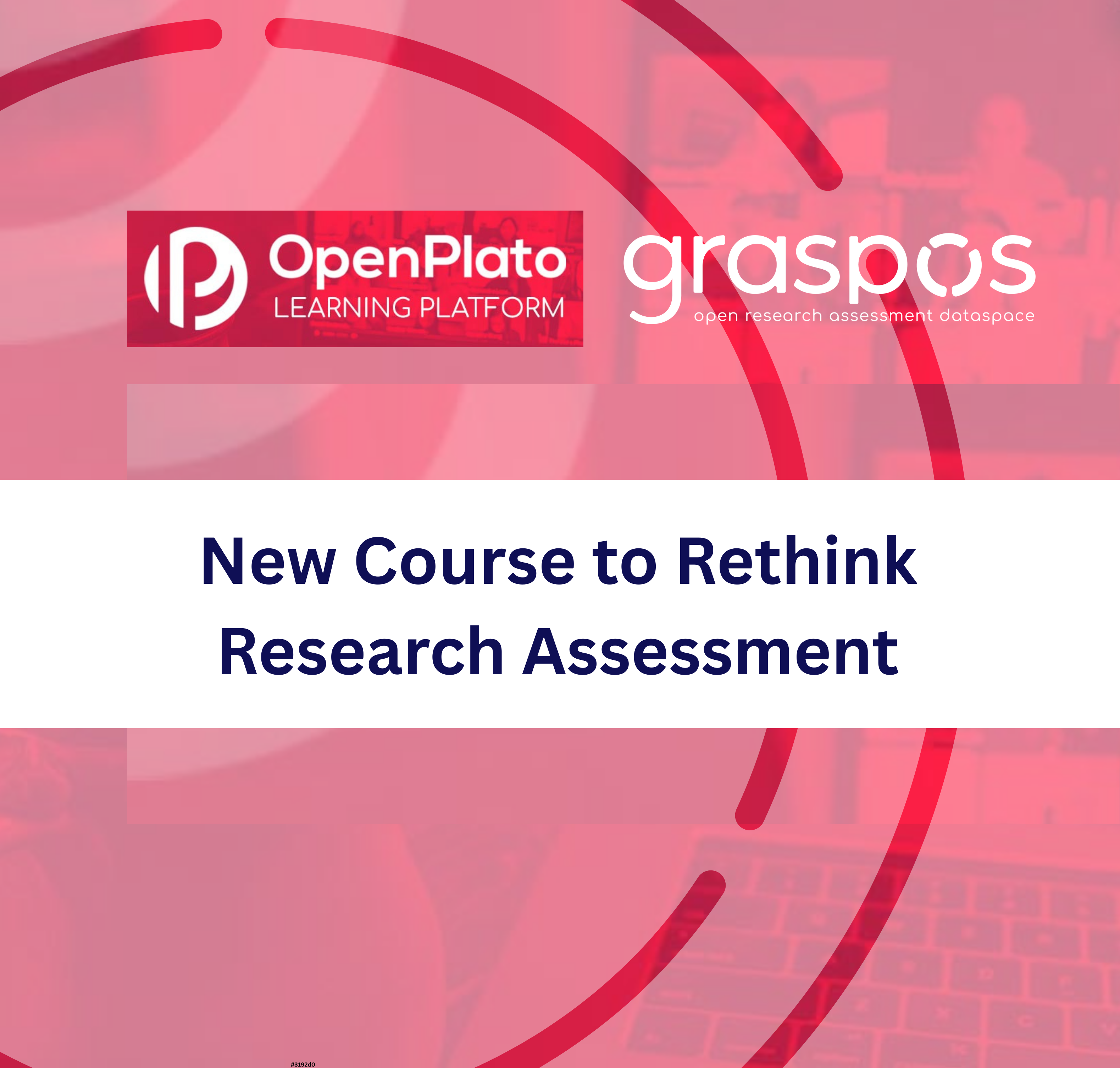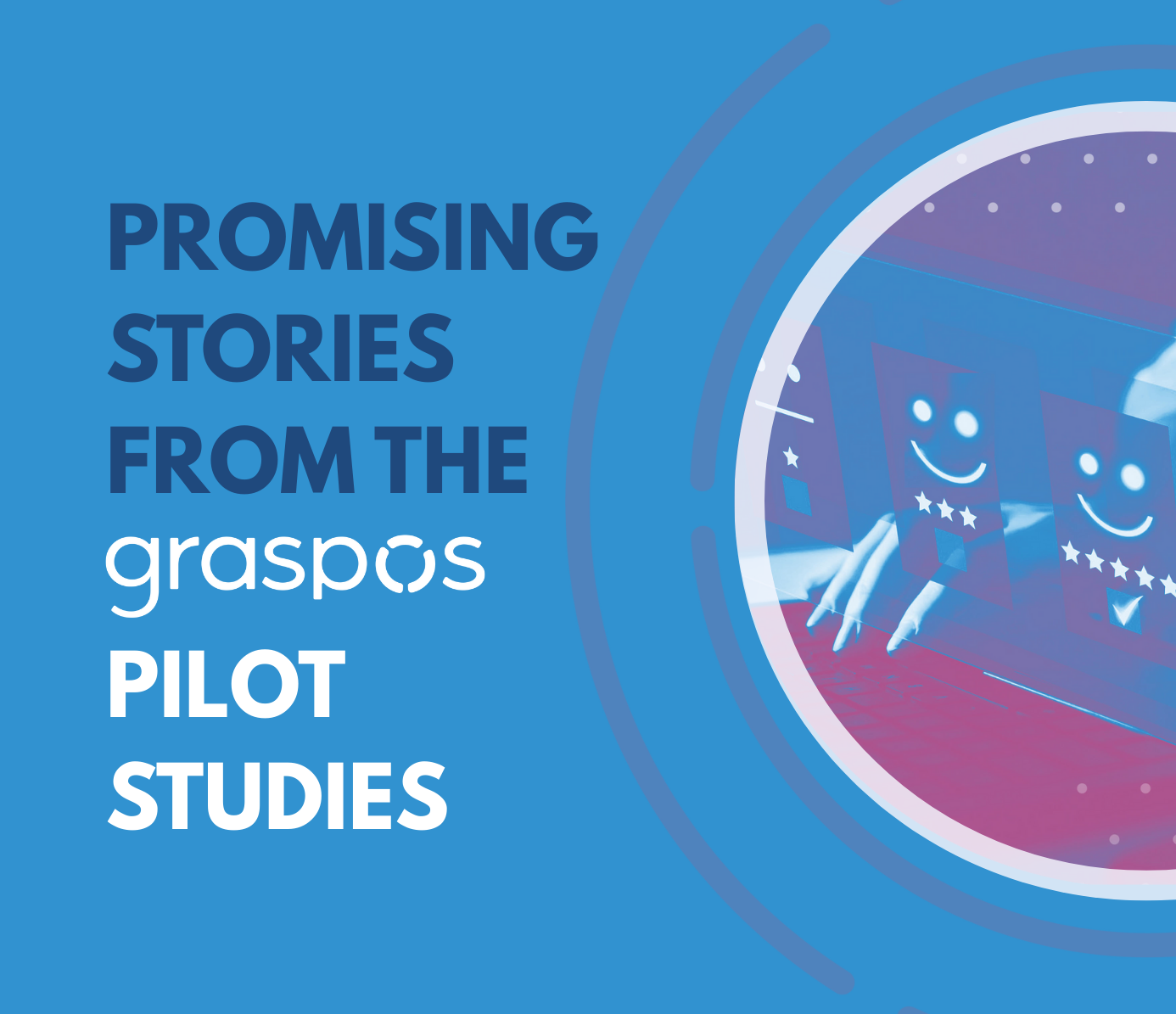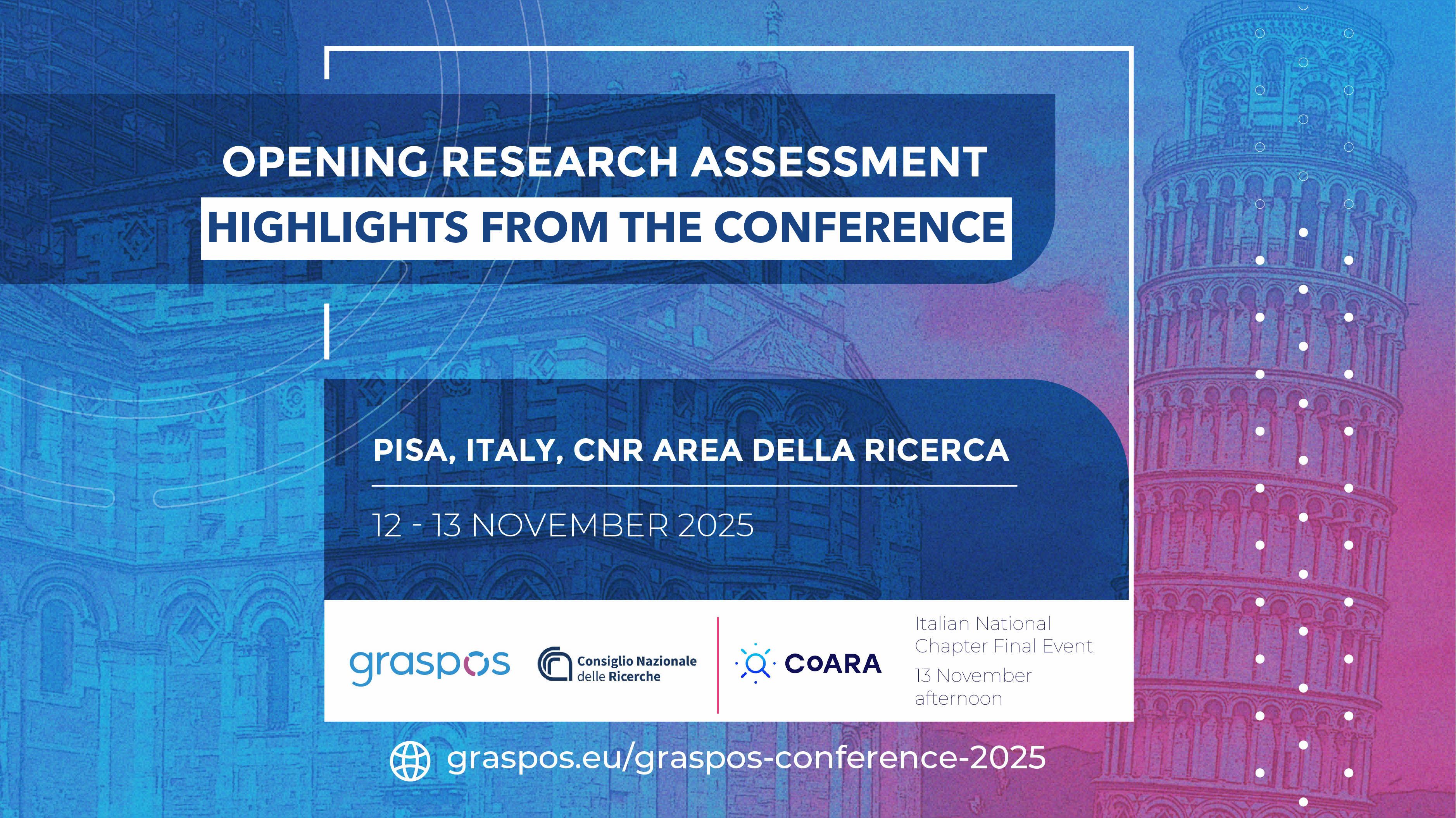GraspOS Chats #9 Get to know Chiara Di Giambattista
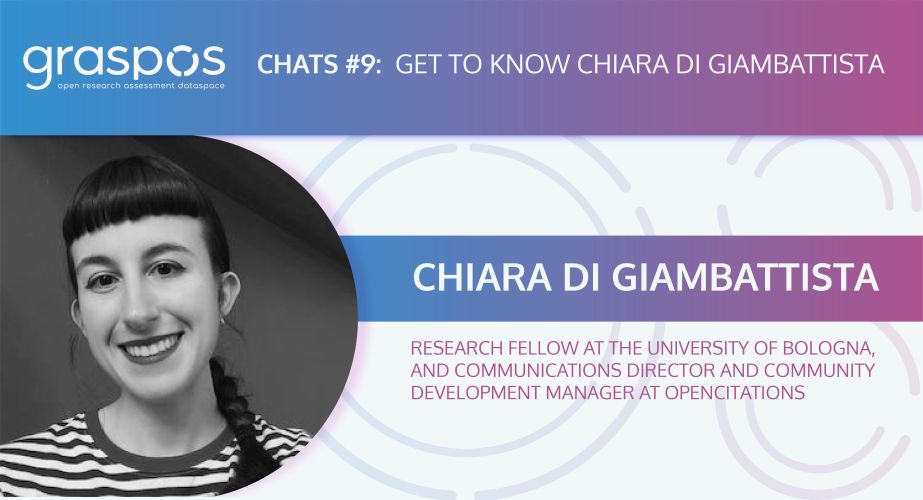
IN THIS SERIES OF INTERVIEWS WE FEATURE GRASPOS MEMBERS TO PRESENT THE PEOPLE BEHIND THE SCENES. WHAT IS THEIR ROLE IN THE PROJECT, THEIR BACKGROUND, AND THEIR VIEW ON THE NEED FOR AN OPEN SCIENCE-AWARE RESPONSIBLE RESEARCH ASSESSMENT SYSTEM?
This month, we had a chat with Chiara Di Giambattista, a Research Fellow at the University of Bologna and the Communications Director & Community Development Manager at OpenCitations, an Open Science Infrastructure organisation managed by the Research Centre for Open Scholarly Metadata at UNIBO. In this Chat, Chiara tells us about the innovative tools her team is developing, some of the main challenges she foresees in reforming research assessment, and how projects and initiatives like GraspOS and OpenCitations contribute to the broader Open Science movement.
You can also follow Chiara on X, Mastodon and LinkedIn
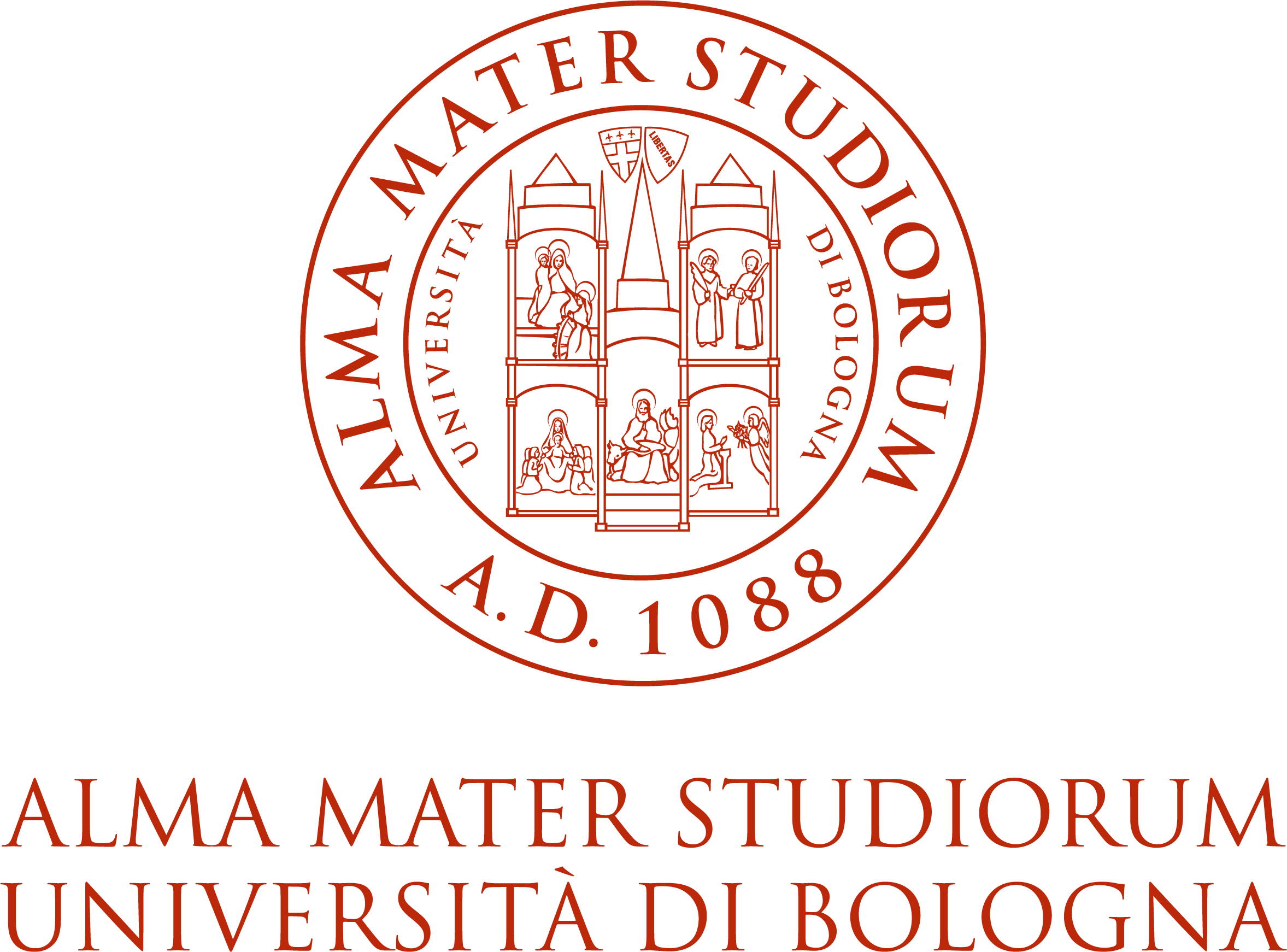
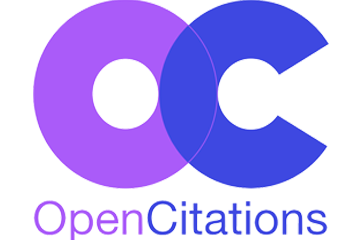
Hello Chiara, Please tell us a bit more about yourself, what are your centres of interest?
I’ve always been interested in literature and art, and passionate about the adaptive potential of language in all its forms, from linguistics to visual semiotics. I graduated in Classics and Visual Arts at the University of Bologna, and have been working in web editing and blogging since then. Within OpenCitations, I’ve started focusing on “communicating the scholarly communication”, by finding ways of promoting our values and mission to make what we do understandable to the research community.
What is your role in GraspOS? If you could highlight one specific aspect of the project that you feel particularly excited about, what would it be?
I’m part of the University of Bologna personnel working in GraspOS. OpenCitations is one of the Data Asset Sources in GraspOS, and our team is contributing to GraspOS by developing a tool for extracting citation data from PDFs through the implementation of machine-learning systems. One of the most exciting aspects of the tool we are developing, which has already been highlighted by OpenCitations Director and Local Unit Coordinator Silvio Peroni in a previous GraspOS Chat, is that it will characterise the extracted citations with their meaning, i.e. the reason why authors cite other works, and that this function will be tested on real users!
I’m currently involved in GraspOS Work Package 6, focusing on the communication and dissemination of the outcomes of the project. Being part of this group is inspirational for the impact that the sharing of ideas and strategies on how to communicate effectively the activities and achievements have on the communication management of the partners, such as OpenCitations. Also, I’m amazed by the network of dissemination that GraspOS is creating by making visible the events and initiatives organised by the partners. For instance, GraspOS promotion is proving to be priceless in announcing the Workshop on Open Citations and Open Scholarly Metadata 2025, an event organised by OpenCitations and the Barcelona Declaration on Open Research Information which will be held in Bologna on May 28-29, 2025, where we hope to welcome many representatives from OpenCitations network of collaborators, including GraspOS, to reflect and discuss on the theme of Open Research Information.
Can you tell us about the first time you heard about Open Science, and what prompted you to get involved?
My first “encounter” with Open Science coincided with the first time I heard about OpenCitations. I had just got my master's degree, and while I was looking around figuring out what to do with the freshly-earned academic title, one of my closest friends who had just started her PhD at the Department of Classical Philology and Italian Studies mentioned one of the projects that were hosted by the Department: OpenCitations. I was immediately surprised by the interdisciplinarity of the project, but above all by its value proposition concerning the Open Science principles, which were kind of new for me as a concept, but seemed something worth being aware of while moving my first steps in the after-degree world. I needed to learn more. So I started doing some research online and stumbled on the recordings of the online seminar “Digital WHOmanities” which was organised in 2020 by the students from the course in Digital Humanities and Digital Knowledge at UNIBO. The talk presenting OpenCitations' work and mission, also mentioning its role in the context of Open Science, blew my mind. The talk was given by Silvio Peroni, who now happens to be my boss, and whose guidance in the first months working in OpenCitations, back in 2021, was fundamental to giving me the right instruments and perspective to learn more about Open Science. Indeed, OpenCitations’ original motto is “OpenCitations for Open Science”, and while I was studying how to communicate our services, I was also learning about the relevance and impact of Open Science and the ways Open Science can be embraced by researchers and institutions.
In your opinion, what are some of the main challenges to reforming research assessment and how can GraspOS support the reform process?
Already in 2013, in an article published in “Nature”, OpenCitations’ Founder David Shotton defined it as a “scandal” that reference lists are not readily and freely available for all scholars. The reproducibility of research is limited by a lack of access to open data and an overall lack of transparency of the methods used and, in particular, the adoption of closed citation data is a threat to transparency, replicability and verifiability of research assessment exercises. Over the years, the community has been striving to set principles to be followed for institutions and researchers to overcome the “replication crisis” which affects Research Information. However, nothing will change deeply until the Open Science practices are adopted as the norm and integrated into the assessment process of researchers and institutions. This transition needs practical steps to be undertaken, and in this perspective, it is fundamental to collectively coordinate the effort towards a common mission, like it is happening in the CoARA Working Group: Towards Open Infrastructures for Responsible Research Assessment (OI4RRA), and through the commitment from the supporters and signatories of the Barcelona Declaration on Open Research Information.
GraspOS is part of this change as a potential hub of experts collaborating in the development of new tools and innovative metric approaches to research assessment.
Thank you Chiara, Lastly, Do YOU HAVE A go-to activity for relaxing after a busy week at work THAT YOU WOULD LIKE TO SHARE WITH US?
I’m lucky to live in Bologna, a city in Italy with a vibrant cultural life. During the weekend I enjoy attending vernissages at local art galleries and exhibitions or visiting other art cities in the area. Also, I’m a kind of foodie, and I like trying new restaurants and wineries with my friends. Also, I love attending stand-up comedy shows featuring both Italian and international comedians: there’s always space for a heartfelt laugh after a busy week!
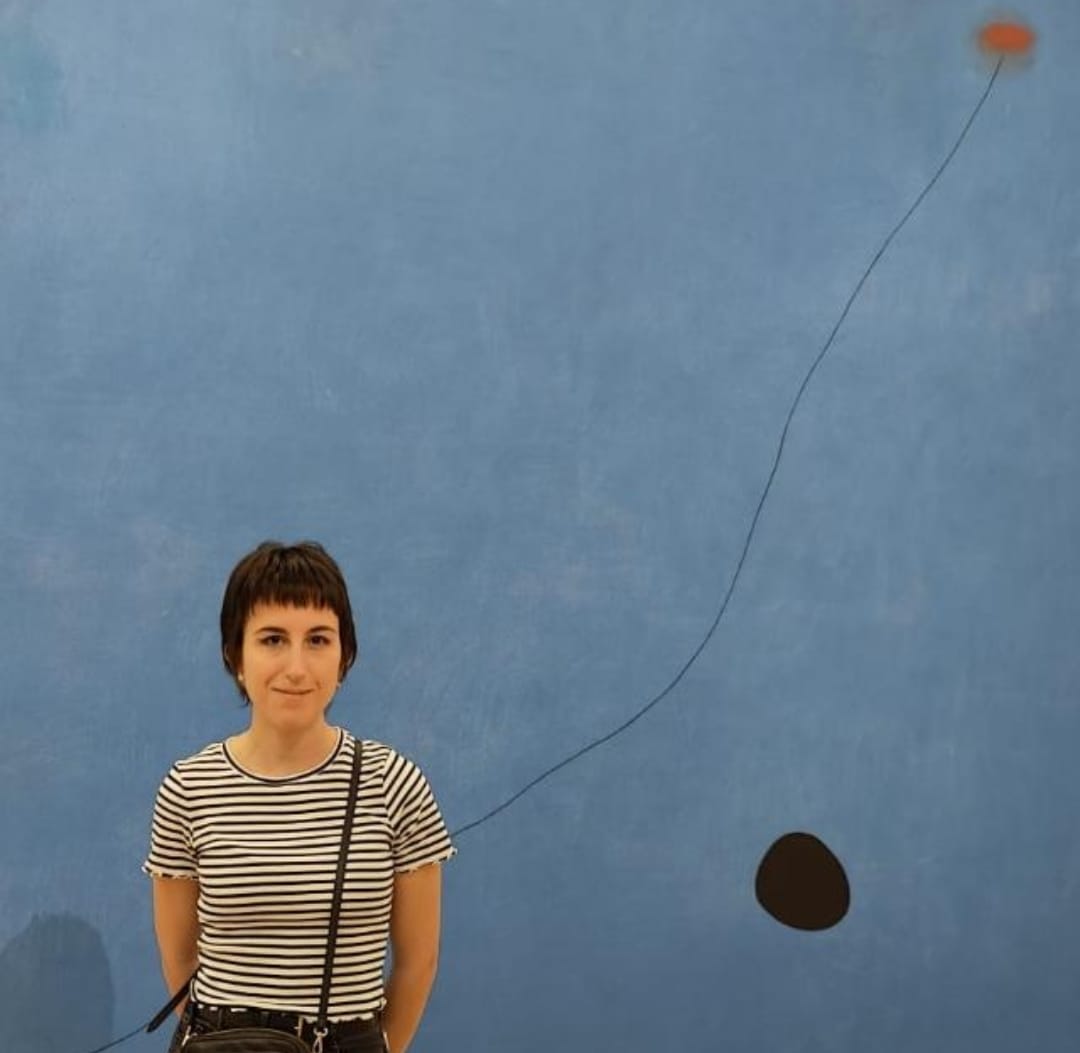
Pompidou Paris, posing with one of her favourite pieces of art
(Bleu III, Joan Mirò) Credits: Chiara Di Giambattista
Thank you so much for your time, Chiara!

